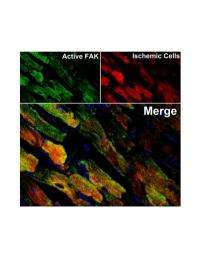Protein modified by researchers may reduce heart attack damage

Scientists modified a protein in the heart which dramatically reduced cell damage after heart attacks, according to new research published the American Heart Association journal Arteriosclerosis, Thrombosis and Vascular Biology.
The modified protein reduced cell damage by 50 percent in mice without causing harmful inflammation, the researchers found. Those results came during research looking at ways to prevent heart failure induced by heart attack.
The protein is called focal adhesion kinase, or FAK. It organizes cell structure by activating various processes that help the cells stay alive.
"FAK is important for basic processes in all cells, and it appears to be important for cell survival, growth and migration in a number of cell types, but is especially critical in the heart," said Joan Taylor, Ph.D., who has been studying FAK in mice at the Department of Pathology and Lab Medicine at the University of North Carolina.
FAK can create problems, too. In earlier research, the scientists found that it was activated in the heart after a heart attack, and spurred a series of events that could lead to inflammation and permanent heart damage.
"Inflammation is important to get rid of dead cells, but if that goes uncontrolled, the inflammation kills viable heart cells," Taylor said.
That's when the researchers began working to build a better FAK, one that would initiate the survival response without causing excessive inflammation. Taylor's former University of North Carolina colleague, Mike Schaller, Ph.D., created what they called SuperFAK, which exhibited increased but controlled activity.
In mice with the new SuperFAK gene, researchers saw a massive activation of FAK after heart attack, and not as many heart cells died compared to unaltered mice. Three days after the induced heart attack, the SuperFAK mice had about 50 percent less heart injury than the unaltered mice. This benefit was maintained for eight weeks.
"We think because the modified FAK resolved its activity in 24 hours, it limited the inflammation response, and only activated beneficial signals," Taylor said.
FAK also plays a role in the development of a number of cancers and has been linked to tumor growth and metastases. Some chemotherapies hamper FAK, leaving the heart vulnerable. Progressive cardiac damage is a common adverse effect of several chemotherapeutic treatments. In the future, they hope to develop drugs to target FAK to protect the heart during chemotherapy or following a heart attack.















